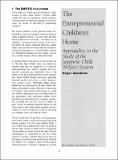| dc.contributor.author | Goodman, Roger | en |
| dc.date.accessioned | 2016-02-24T13:29:44Z | |
| dc.date.available | 2016-02-24T13:29:44Z | |
| dc.date.issued | 01/10/1999 | en |
| dc.identifier.citation | Goodman, R. (1999) The Entrepreneurial Children's Home . IDS Bulletin 30(4): 71-81 | en |
| dc.identifier.issn | 1759-5436 | en |
| dc.identifier.uri | https://opendocs.ids.ac.uk/opendocs/handle/20.500.12413/9097 | |
| dc.description.abstract | Summaries This article is an exploration of how assumptions about how welfare should be provided can affect the conclusions one draws from studying the welfare system of another society, and how immersion in a welfare system of another country can lead to different conclusions about how welfare might best be provided. It is based on an analysis of Japan's child welfare system, in particular homes ( yôgoshisetsu ) for children whose parents cannot care for them, and seeks to compare a critique of them based largely on assumptions culled from social work practice in north Europe with a more sympathetic analysis in terms of Japanese practice. It concludes that, while neither analysis should be termed ‘correct’, it is incumbent on any researcher to provide both types of account (what might be termed an ‘etic’ and an ‘emic’ picture) when describing the welfare system of another society. | en |
| dc.format.extent | 11 | en |
| dc.publisher | Institute of Development Studies | en |
| dc.relation.ispartofseries | IDS Bulletin Vol. 30 Nos. 4 | en |
| dc.rights.uri | http://www.ids.ac.uk/files/dmfile/IDSOpenDocsStandardTermsOfUse.pdf | en |
| dc.title | The Entrepreneurial Children's Home | en |
| dc.type | Article | en |
| dc.rights.holder | © 1999 Institue of Development Studies | en |
| dc.identifier.doi | 10.1111/j.1759-5436.1999.mp30004009.x | en |

